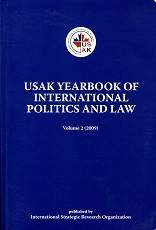Determinants of German Foreign Policy toward the Arab-Israeli Conflict
Determinants of German Foreign Policy toward the Arab-Israeli Conflict
Author(s): Mohammad Abo-KazlehSubject(s): Politics / Political Sciences
Published by: USAK (Uluslararası Stratejik Araştırmalar Kurumu)
Keywords: German foreign policy; Arab-Israeli conflict; historical factor; pragmatism; national framework; European framework
Summary/Abstract: The purpose of this paper is to examine the German foreign policy toward the ِArab-Israeli conflict. It particularly focuses on the driving forces in the making of this policy. It first briefly reviews German interests and priorities in the region which include, economic interests related to safe access to energy sources and boosting German exports to regional markets; security interests related to avoiding risks emerged from the Arab-Israeli conflict, terrorism and the proliferation of the weapons of mass destructions, and preventing any further increase in refugees from the region; and finally political interests which is related to the peace process between Palestinians and Israelis, and enhancing stability in other regional areas such as Lebanon. These interests generally represent a pragmatic approach in German foreign policy towards the region. However, and in spite of increasing German interests there, pragmatism is not the driving force behind German Middle East foreign policy. Still, the special relationship with Israel is the guideline in making this policy. The analysis of both pragmatism and the special relationship with Israel as main determinants of German foreign policy toward the Arab-Israeli conflict shows that the interplay of these factors leaves Germany with a dilemma, because they 'do not always push in the same direction.' This in turn affect negatively German political role and influence in the Middle East. Therefore, and in the light of its growing national interests in the region, Germany needs a policy of maintaining economic ties with the Arab countries, and concurrently preserving its special relationship with Israel. If Germany succeeds in striking a balance between its strong commitments to Israel's security, and its acceptance to the Palestinian right of self-determination and interest in boosting economic and trade exchange with Arab countries, then it will be able to play a more active role in the region and may influence the attitudes of parties involved in the Arab-Israeli conflict.
Journal: USAK Yearbook of Politics and International Relations
- Issue Year: 2009
- Issue No: 2
- Page Range: 17-43
- Page Count: 17
- Language: English

